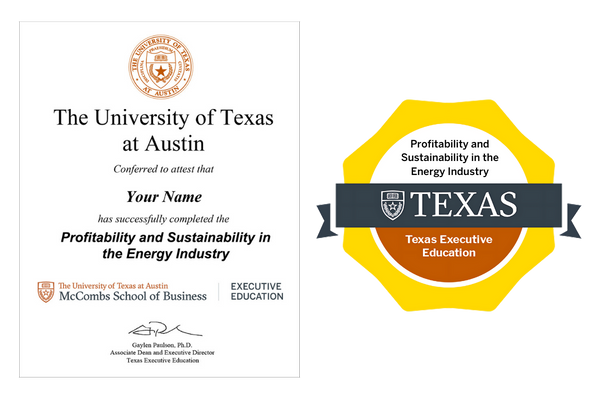Profitability and Sustainability in the Energy Industry
BALANCE SUSTAINABILITY WITH GROWTH
Sustainable growth in energy requires long-term strategies that continue to add economic value while also ensuring that our future is viable. As there are multiple pathways to sustainable growth, it is important that you identify and analyze value creation opportunities that are a good fit for your organization.
The Profitability and Sustainability in the Energy Industry program from Texas Executive Education at the McCombs School of Business is designed by expert faculty with extensive experience in the energy sector. Through a combination of live learning sessions, case studies, engagement with peers, and a final capstone project, the six-week curriculum empowers energy professionals to cultivate strategies that focus on sustainable value creation with an eye toward regulatory, financial, and environmental factors.

PhD, Adjunct Faculty, Texas Executive Education, UT Austin
"The energy sector is among the most dynamic and complex landscapes on earth. We must understand the balance between government incentives and market price signals and use ...
PARTICIPANT PROFILE
The Profitability and Sustainability in the Energy Industry program is ideal for professionals in the energy industry, including:
Energy executives
who envision a different future, where both sustainability and growth co-author the strategic plan of an organization or system
Grid operators
who strive toward maximum energy system efficiencies during daily operations and optimal financing methods for ESG-related investments
Energy managers
who are in positions to influence policy and the regulatory environment, supporting or granting the social license to operate
CURRICULUM
This six-week program enables participants to identify, analyze, and implement sustainable value creation strategies in the unpredictable energy sector. The curriculum, organized into weekly modules, offers flexibility in accessing study materials. Weekly activities encompass faculty sessions, assignments, and case studies, giving participants a grounding in corporate valuation, risk assessment and management, ESG disclosures, and financing.
CAPSTONE PROJECT
Apply the knowledge you have gained throughout the program to a real-world scenario, demonstrating the ability to identify and analyze sustainable value creation opportunities within the energy industry. The focus of this project is evaluating the geopolitical factors associated with different locations and determining which one is more attractive for investment. You will identify the technical, commercial, and non-technical risks associated with each technology and geography to make informed decisions in a rapidly evolving business environment.
KEY PROGRAM FEATURES

Expert Faculty
Gain in-depth insights from world-renowned faculty and expert practitioners with practical industry experience.

Live Sessions
Join a live session with the faculty director as well as live weekly office hours with program leaders to deepen your understanding and answer your questions.

Application Exercises
Apply the learnings on topics ranging from the impact of incentives to ESG disclosure and related best practices.

Peer Learning
Interact with like-minded energy executives from across the world and share insights with each other.

Real-World Examples
Drawing on the broad expertise of faculty, proprietary frameworks and use cases from across the entire energy ecosystem serve to make the learnings holistic.

Capstone Project
Apply your insights to a project where you will identify and analyze sustainable value creation opportunities within the energy industry.

Certificate of Completion
Demonstrate your commitment to forward-thinking leadership with a Certificate of Completion from The University of Texas at Austin, McCombs School of Business.
MEET THE FACULTY

Assistant Director, Energy & Technology Policy at the Energy Institute
Dr. Fred Beach is responsible for conducting research and supervising studies related to the development of energy, environmental, and technology policy. He also teaches Energ...

Adjunct Faculty, Texas Executive Education, UT Austin
Gürcan Gülen, PhD, is an energy economist and an industry thought leader with 25 years of international experience. His work focuses on policy and market research on oil, na...

The Bake Chair in Global Sustainability Leadership; The Charles T. Zlatkovich Centennial Professor of Accounting; and the Executive Director of the Global Sustainability Leadership Institute
Jeffrey Hales' research focuses on setting standards in accounting and regulation, individual decision making, and behavioral finance, using techniques from applied game theor...

CERTIFICATE
Upon successful completion of the program, participants will be awarded a certificate and a digital badge from the University of Texas at Austin, McCombs School of Business.
After successful completion of this program, your digital certificate will be emailed to you in the name you used when registering for the program. All certificate images are for illustrative purposes only and may be subject to change at the discretion of the University of Texas at Austin.
Note: This program does not grant academic credit or a degree from The McCombs School of Business.
FAQs
Didn’t find what you were looking for? Write to us at learner.success@emeritus.org or Schedule a call with one of our Program Advisors or call us at +1 361 344 4980 (US) / +44 138 443 7887 (UK) / +65 3138 4361 (SG)
Early registrations are encouraged. Seats fill up quickly!
Flexible payment options available.
Starts On
